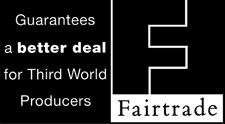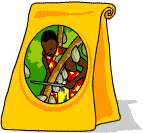The Fairtrade Mark
Created | Updated Jan 28, 2002

Under conventional trade, a pound of coffee which is sold for almost $8 in the USA could bring only 80 cents to the Central American farmer who is grows it.
There are millions of communities in under-developed regions of the world who suffer exploitation at the hands of the multinational companies who buy goods too cheaply from local producers, ship them overseas, and sell them at a fat profit for the shareholders. For instance the real price of a banana cannot be looked at as simply as the price offered to the grower, plus shipping and profit for middle men and the retailers. This is also exacerbated by multinational corporations having a monopoly in the market place and their ability to manipulate the prices even further in their favour. The multinationals arrange prices with producers at the time of planting, and if world prices have risen by harvest time they stick by this agreement, though if it has fallen they either offer a much lower price or refuse to buy.
International trade may seem to make only a small contribution to world poverty, compared with the more publicised effects of war, famine, disease, corrupt governments and the natural disasters that appear on TV on a regular basis. However, when a community only produces one or two products for a faraway market and the prices offered by the buyers are lowered for their product due to world surplus, monopoly, market manipulation by unscrupulous stock brokers or a sudden drop in demand, this has a dramatic effect on trade-dependent communities in the developing world. The producers are widely distributed around the world and it may be that one product is the main export of an entire country! On a local level, it drastically affects the lives of the small-scale producers and their communities, sending people and small businesses into crippling debt and causing many others to lose their land and their homes.
Fighting Poverty through Trade

Fair trade is about working together to change the injustice of small producers being disadvantaged by fluctuations in world market prices. This is done by creating opportunities for:
The small producer in the developing world to work their way towards a higher quality of life.
For consumers in the developed world, giving them an opportunity to be instrumental in the movement for a positive change that is vastly improving the quality of life in the many areas from which fair trade products have been bought.
The Definition of Fair Trade
The International Federation for Alternative Trade (IFAT) is a network of 158 Fair Trade organisations around the world. At the IFAT Annual General Meeting held in May 1999, the following definition of fair trade was agreed upon as a working text:
Fair trade is an alternative approach to conventional international trade. It is a trading partnership which aims at sustainable development for excluded and disadvantaged producers. It seeks to do this by providing better trading conditions, by awareness raising and by campaigning.
The Goals of Fair Trade
To improve the livelihoods and well-being of producers by improving market access, strengthening producer organisations, paying a better price and providing continuity in the trading relationship.
To promote development opportunities for disadvantaged producers, especially women and indigenous peoples, and to protect children from exploitation in the production process.
To raise awareness among consumers of the negative effects on producers of international trade so that they can exercise their purchasing power positively.
To set an example of partnership in trade through dialogue, transparency and respect.
To campaign for changes in the rules and practice of conventional international trade.
To protect human rights by promoting social justice, sound environmental practices and economic security.
Fair Trade Makes a Real Difference to People's Lives
It empowers consumers in the developed world to take some responsibility for the role they can play when buying products from developing countries.
It means producers in the developing world can look forward to getting a fair price for their efforts and their produce.
It challenges the conventional model of international trade, offering a progressive alternative for a sustainable future.
In the global free market, producers are too often exploited by those companies controlling world markets. Receiving a fairer price means they can have some of the many things consumers in the developed world take for granted, such as education for their children, an unpolluted environment, decent working conditions, a stable income and affordable health care, raising the standard of living for all the community.
What's different about working with Equal Exchange is that we send our coffee directly to them without intermediaries. The extra money our cooperatives receive makes a difference in medicines and nurseries to care for our children.
- Mateo Rendon of FESACORA1
UCIRI (the Union of Indigenous Communities of the Isthmus Region), located in the southern Mexican state of Oaxaca, was the first group of farmers in Mexico to export coffee through the fair trade model. Since the introduction of fair trade practices, the incomes of their over 2000 member families have doubled. This stability has also enabled UCIRI to establish the region's first public bus line, build the only secondary school in the area and build a community health clinic.
- IFAT website
These are just a few reasons why fair trade is such a challenging, revolutionary and important idea, and why people must be encouraged to buy fairly-traded produce and join the campaign for fairness in international trade, putting people before profits.
Fair Trade Goods
A range of fair trade products, including crafts, fashions, foods (such as chocolate, honey, bananas and other fruit), beverages (tea, coffee, fruit juice), paper and cards are available. Products are sold through an extensive network of small retailers and many big supermarkets have a token few products available for purchase. Mail-order companies exist all over the world, from small specialist grocers to new on-line suppliers. You can also check out the legendary Starbucks for a token sample of fair trade coffee.
The Fairtrade Foundation and the Fairtrade Mark
The Fairtrade Foundation created the term Fairtrade to describe the goods marketed to provide support and assistance to communities ravaged by fluctuations in the global market place. It was founded by CAFOD (Catholic Foundation for Oversea Development), Christian Aid, New Consumer, Oxfam, Traidcraft and the World Development Movement, who were joined later by the Women's Institute. The foundation grants a consumer label, the Fairtrade Mark - two black interlocking F's on a white background - to products which meet internationally recognised standards of fair trade. For a more in-depth analysis of the criteria go to Fairtrade International.

